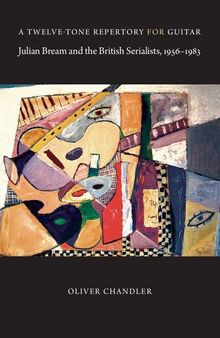 جزییات کتاب
جزییات کتاب
While the history of the formation of a modern British guitar repertoire around the central figure of Julian Bream is known in broad brushstrokes, we lack a thoroughgoing, technical understanding of the particular idiom that Bream’s composers developed. Important in the nascent stages of the guitar’s modernist evolution, for example, was its relationship to twelve-tone serialism. Through close readings of individual works by Reginald Smith Brindle (El Polifemo de oro, 1956), Denis ApIvor (Variations, 1958), Thomas Wilson (Three Pieces, 1961; Soliloquy, 1969), and Richard Rodney Bennett (Impromptus, 1968; Sonata, 1983), I map the formation of a peculiarly British vein of dodecaphony. To varying extents, these composers adapted or rejected the techniques, systems, and/or aesthetics of the Second Viennese and Darmstadt schools in order to arrive at a more moderate compositional approach. But despite this common cause, their approaches to composing dodecaphonically on the guitar differed substantially: ApIvor and Bennett attempted to build their twelve-tone materials around the guitar’s affordances; Smith Brindle and Wilson saved idiomatic sonorities and playing techniques for moments in which twelve-tone logic was to be purposefully overridden.
By exploring the foregoing ideas and themes analytically, I attempt to demonstrate, in as musical a way as possible, how some of the most pressing compositional questions of the mid-twentieth century—Is twelve-tone serialism the only way forward? Is musical tradition dead in the water?—were responded to by composers crucial to the guitar’s modernist legacy.
 دانلود کتاب
دانلود کتاب
 جزییات کتاب
جزییات کتاب









 این کتاب رو مطالعه کردید؟ نظر شما چیست؟
این کتاب رو مطالعه کردید؟ نظر شما چیست؟
